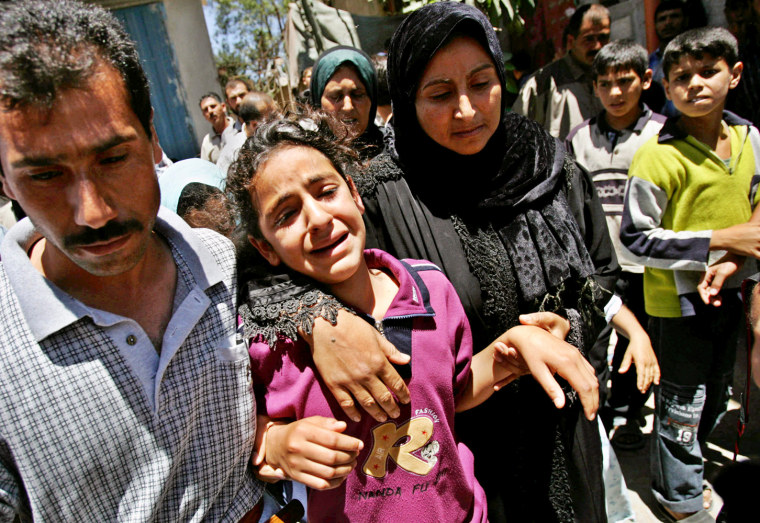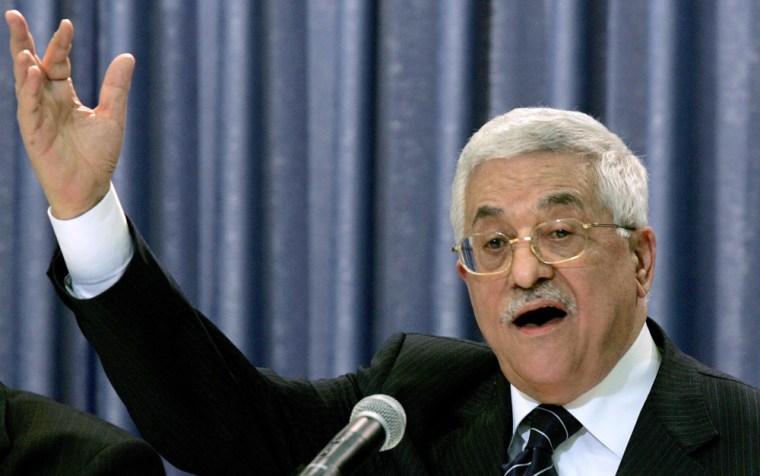Moderate President Mahmoud Abbas, defying the Hamas militants who run the government, said Saturday that Palestinians would vote next month on whether to establish a state alongside Israel, effectively recognizing the Jewish nation.
Hamas immediately rejected the notion of the July 26 referendum, which is expected to win a clear majority despite rising anger at Israel and increased infighting between the militants and Abbas’ Fatah movement.
Meanwhile, Palestinian militants on Sunday released an American they had briefly kidnapped in the West Bank, security officials said.
The U.S. citizen, Benjamin Fishbein, was snatched by gunmen while having coffee at a coffee shop in the Palestinian city of Nablus, said Rafa Roagbe, head of Palestinian security in the city.
Fishbein, who spent time in Cairo and is currently studying at Jerusalem’s Hebrew University, went to Nablus as a tourist, Roagbe said. Fishbein wears a traditional Jewish skullcap but does not speak Hebrew, he added.
It appears the militants agreed to quickly release Fishbein because he is an American who does not hold Israeli citizenship.
Abbas rebuffs Hamas
On Saturday, Hamas fighters battled Abbas loyalists in Gaza and fired rockets and mortars at Israel, ending a 16-month truce after an explosion blamed on Israeli shelling Friday killed eight people and wounded dozens at a seaside family picnic.
“We have to rule out the idea of a referendum,” Palestinian Prime Minister Ismail Haniyeh of Hamas said.
Abbas said the vote could be called off if the sides reach agreement on the document, which was written by prominent Palestinian militants jailed by Israel and calls for a Palestinian state in the West Bank and Gaza.
Establishing the state in those lands, captured by Israel in the 1967 Mideast War, would be an implicit recognition of Israel.
Abbas denounced the deaths of the Gaza beachgoers but brushed off Hamas’ call to put off the vote due to the renewed violence. He said accepting the referendum would help the Palestinians achieve their dream of statehood and end a debilitating international aid boycott imposed after Hamas’ rise to power.
“When we reach an agreement over the prisoners’ document, the siege will end,” Abbas said.
Later, Abbas and Haniyeh met in Gaza along with Hamas Interior Minister Said Siyam. Abbas’ spokesman said the president made clear to Haniyeh that the referendum would be held as planned, despite the prime minister’s opposition.
Haniyeh, repeating Hamas’ rejection of the vote, said that he had agreed to meet with Abbas again on Sunday, and that dialogue would continue.
Palestinians will be asked to vote “yes” or “no” on the document, which polls show enjoys wide support among Palestinians, partly because of the clout of its authors.
Refusal to recognize Israel
Accepting it could give Hamas, which is officially sworn to Israel’s destruction, an avenue for moderating its ways.
So far the group has not budged from its refusal to recognize Israel, renounce violence and accept past peace accords. Israel and the international community require those steps before they will deal with the group.
Hamas claimed responsibility Saturday for firing at least 15 rockets and a barrage of mortar shells at Israel — essentially ending its 16-month truce.
The army said more than two dozen homemade rockets and mortar shells were fired at Israel on Saturday. No casualties were reported.

Israel’s army chief expressed regret for Friday’s civilian deaths, but stopped short of accepting responsibility for the incident. Lt. Gen. Dan Halutz said an investigation was still underway, and it was still not clear what caused the deaths.
The investigation had so far ruled out gunboats and an airstrike, but it is still possible Israeli artillery or even a misfired Palestinian rocket caused the deaths, Halutz said.
Abbas condemned the killings as a “genocidal crime.” Haniyeh called the shelling a “war crime” and called for an end to Hamas-Fatah fighting.
Factions continue to clash
Tensions between Abbas and Hamas have been increasing since the Islamic militant group, which won a January parliamentary election, took power in March.
Abbas, elected separately last year, still wields considerable authority and Fatah and Hamas are battling over control of the security forces. Factional fighting in Gaza’s streets has raised the specter of civil war.
The unsuccessful negotiations between Abbas and Hamas over the prisoners’ document also have exposed divisions between Hamas’ local officials and its Syria-based leadership, which has held sway.
Meanwhile, new violence erupted between gunmen loyal to the president and Hamas’ militia before Abbas’ announcement.
Gunmen shot and killed a 39-year-old Palestinian security officer in a botched kidnapping attempt, Palestinian Preventive Security officials said. The force, loyal to Abbas, accused Hamas of the killing and vowed to impose justice.
During the funeral procession, a gunbattle erupted between gunmen from Hamas and the Preventive Security force. The car of Gaza’s top pro-Abbas general was caught in the crossfire, and he was rushed out of the area.
Four people were wounded, including one seriously, hospital officials said. Hamas gunmen took up positions in the area, leading to a tense standoff.
